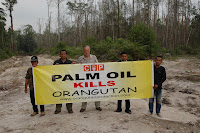Who is to blame? The government of Indonesia and the palm oil companies.
What can be done? Please check our our web site www.naturealert.org to see what YOU can do to help.
October 30, 2007
Central Kalimantan (Borneo)

Where once ancient, magnificent rainforest's once stood, full
of wildlife, now destroyed and replaced with oil palm plantations.

The silence is deafening. No birds, no insects, no
wildlife. Nothing but oil palm plants as far as the eye can
see in every direction.
Indonesia's own Centre for Orangutan Conservation is leading

the campaign locally to prevent a forest owned by a
Dayak villager (left of photo) being cut down. His forest is
home to some 50 orangutans, and yet just one week earlier
illegal loggers came and cut down 60 trees. When we took
the owner to the local police they refused to help as they
feared recriminations from the local mafia.
Palm oil companies are causing havoc across Indonesia.
 More often than not, land is logged and then left bare -
More often than not, land is logged and then left bare -their primary motive being to make a fast profit from the
remaining trees. When you visit Borneo you feel like you
are in the middle of a gold-rush' - take what you can as
quickly as you can, either before your competitor does or,
before it's all gone.

A trail of destruction left by the illegal loggers.

A week earlier this tree formed part of the orangutans
home territory.

The owner of the Cempaga forest.
The loggers gained access to his forest via tracks/roads
made by palm oil companies. They stole 60 of his trees as well as
some personal possessions from his camp.

Wood like this often finds its way onto the shelves of
European and American stores. If you see any hardwood
products (garden furniture, in particular) on sale
and it is labelled as 'Origin Japan, China, or any Asian
country, there is every chance it was illegally felled in
Indonesia. To be safe, please don't buy these products.

The orangutans home, possibly on its way to your home in
the form of chairs, etc.

The loggers take away another load of fresly cut trees.
Despite this photographic evidence of illegal logging,
local police refused to get involved.


























































-a.jpg)








